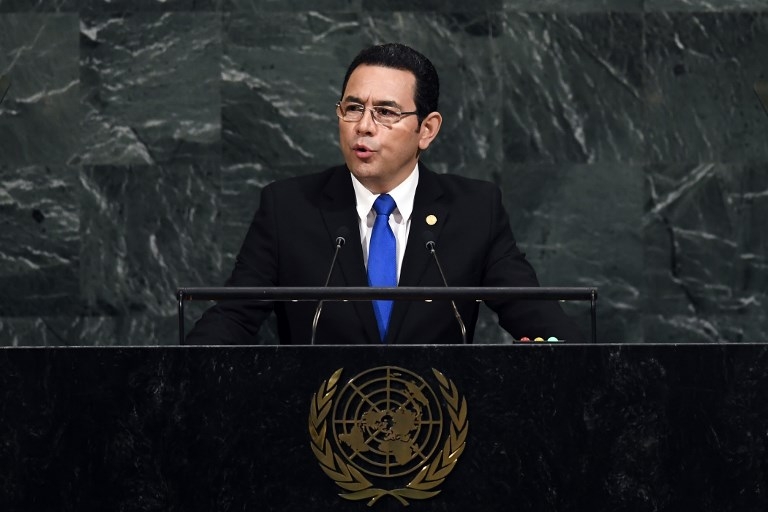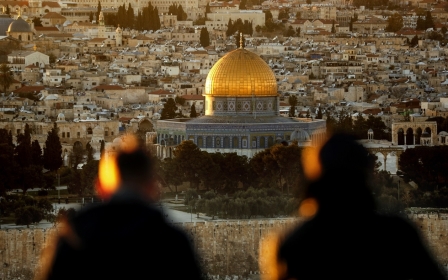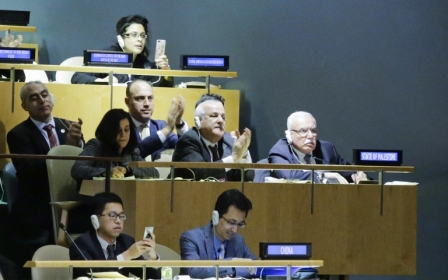Israel praises Guatemala over Jerusalem embassy move

Israeli Prime Minister Benjamin Netanyahu thanked Guatemalan President Jimmy Morales with a “God bless you” on Monday over his decision to move the Central American country’s embassy to Jerusalem.
In a short post on his official Facebook account on Sunday, Morales said he had chosen to relocate the embassy from Tel Aviv - siding with the United States in a dispute over Jerusalem’s status - after talking to Netanyahu.
US President Donald Trump recognised Jerusalem as the capital of Israel on 6 December, reversing decades of US policy and upsetting the Arab world and Western allies.
On Thursday, 128 countries defied Trump by backing a non-binding UN General Assembly resolution calling on the United States to drop its recognition of Jerusalem.
“God bless you, my friend, President Jimmy Morales, God bless both our countries, Israel and Guatemala,” Netanyahu said, switching to English, in remarks to a weekly meeting of his Likud party faction in parliament.
Guatemala and neighbouring Honduras were two of only a handful of countries to join Israel and the United States, which has pledged to move its embassy to Jerusalem, in voting against the UN resolution.
Israel’s ambassador to Guatemala, Matty Cohen, said on Army Radio that no date had been set for the embassy move, “but it will happen after” the United States relocates its own embassy to Jerusalem. US officials have said that move could take at least two years.
The United States is an important source of assistance to Guatemala and Honduras, and Trump had threatened to cut off financial aid to countries that supported the UN resolution.
'Shameful' move
Meanwhile, the Palestinian foreign ministry slammed as "shameful" Guatemala's decision to transfer its embassy to Jerusalem.
"It's a shameful and illegal act that goes totally against the wishes of church leaders in Jerusalem" and violates a non-binding UN General Assembly resolution condemning the US move, the ministry said in a statement.
"The state of Palestine considers this as a flagrant act of hostility against the inalienable rights of the Palestinian people and international law," it said.
"The state of Palestine will act with regional and international partners to oppose this illegal decision."
Trump's announcement on 6 December sparked anger in the Palestinian territories and across the Muslim world.
Israel seized the eastern part of Jerusalem in the 1967 Six Day War and later annexed it in a move not recognised by the international community.
Israelis see the whole of the city as their undivided capital while the Palestinians view the east as the capital of their future state.
No country currently has its embassy in Jerusalem, instead keeping them in the Israeli commercial capital Tel Aviv.
The status of Jerusalem is one of the thorniest obstacles to an Israeli-Palestinian peace deal. Palestinians want East Jerusalem as the capital of a state they want to establish in the occupied West Bank and in the Gaza Strip.
The international community does not recognise Israeli sovereignty over the entire city, home to sites holy to the Muslim, Jewish and Christian religions.
Prior to 1980, Guatemala - along with Bolivia, Chile, Colombia, Costa Rica, the Dominican Republic, Ecuador, El Salvador, Haiti, The Netherlands, Panama, Venezuela and Uruguay - maintained an embassy in Jerusalem.
Israel’s passage in June 1980 of a law proclaiming Jerusalem its “indivisible and eternal capital” led to a UN Security Council resolution calling upon those countries to move their embassies to Tel Aviv, prompting their transfer.
New MEE newsletter: Jerusalem Dispatch
Sign up to get the latest insights and analysis on Israel-Palestine, alongside Turkey Unpacked and other MEE newsletters
Middle East Eye delivers independent and unrivalled coverage and analysis of the Middle East, North Africa and beyond. To learn more about republishing this content and the associated fees, please fill out this form. More about MEE can be found here.




